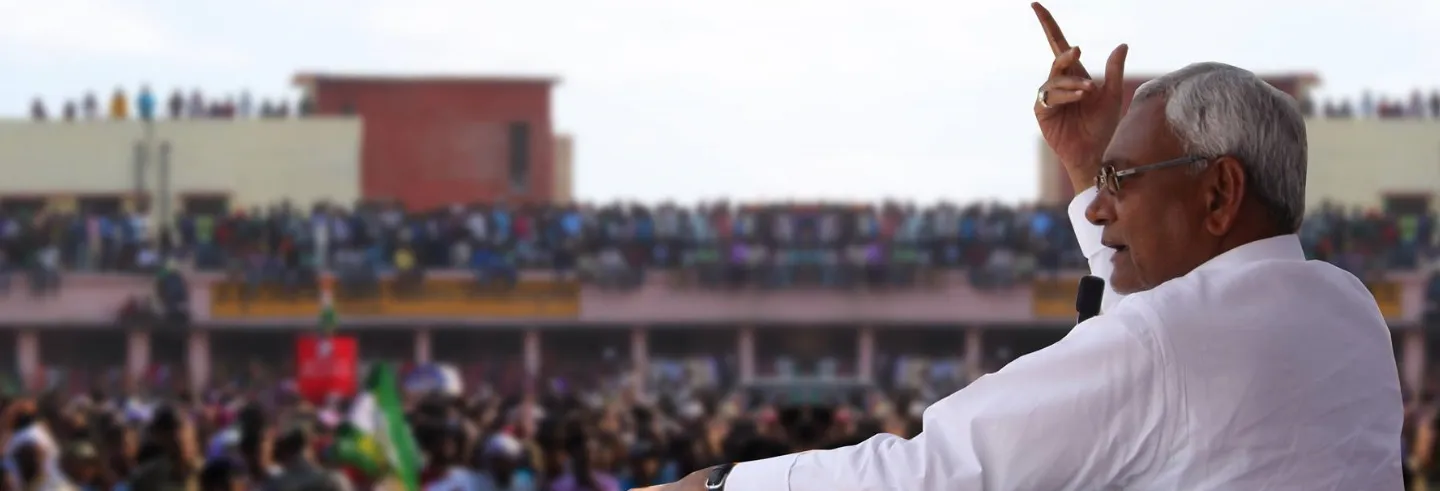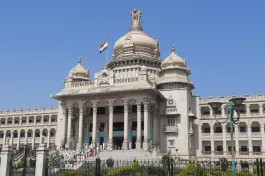Bihar has a new government. The chief minister remains the same.
This is the second time that Nitish Kumar, while enjoying a legislative majority, has resigned and immediately staked claim to form a government with the support of new partners. In 2017 he resigned as the chief minister from the Mahagathbandhan alliance of the Rashtriya Janata Dal (RJD), Congress, and Left, to came back with the support of the Bharatiya Janata Party as the CM of an NDA government. This time he resigned as the CM of the NDA government and returned with a Mahagathbandhan government.
On both occasions he went against the popular mandate to change the government midway. Nitish Kumar's Janata Dal (United) party was a junior partner of the alliance, having fewer seats in the assembly than its partners. But there never arose the question of him not being the chief minister.
While Nitish Kumar’s move was hailed by the media last time, when he chose the BJP despite it being defeated in the elections, this time he is being assailed as ‘Mr U-turn’, taking Bihar back to an era of anarchy and lawlessness.
Clearly, Nitish Kumar’s move has rattled the media and the BJP. It has shaken up the political scene and created new possibilities for political forces opposed to the BJP. A sense of inevitability of the continuance of the BJP even after 2024 had paralysed political parties and even people who think that the BJP has to go for India to survive as a nation. Agitations in the streets were not able to fire up the imagination of people. A numbness gripped the opposition, resulting from relentless attacks by central investigative agencies and the BJP’s poaching from rivals to form governments even in states where it was defeated in elections.
In this despondent atmosphere, Nitish Kumar’s Machiavellian move has infused life in the opposition. It proves that if you keep your cards close to your chest, maintain a cool mind, and keep an eye on the moves of your opponent, you can checkmate him. But for that you need to be Nitish Kumar.
The swiftness of Nitish Kumar’s move has taken observers of Bihar by surprise. The ease with which the RJD and the JD(U), till then estranged partners, embraced each other and the smoothness with which the new cabinet was formed without any delay is also extraordinary.
In this drama, Nitish Kumar may be the protagonist but the role of the RJD's Lalu Prasad cannot be minimised. His astute political sense of not letting go of any opportunity to keep the BJP out of power led him to persuade his son Tejaswi Yadav to accept Nitish Kumar back to his fold. It also demonstrates the political maturity of Tejaswi Yadav, who had vowed not to let Nitish Kumar enter his house again after the betrayal of 2017.
[Nitish Kumar] has no ideological inhibitions when it comes to choosing his partners.
It is also remarkable that not one MLA from either the numerically weak and vulnerable JD(U) or the other smaller alliance parties could be broken away by the BJP which has mastered the art of splitting parties. Only last month, it had done so in Maharashtra.
Yet, there are people who want to turn Nitish Kumar’s about-turn into a tactical move of the BJP. They refuse to believe that anything could happen in this country without the BJP wanting it to happen. So, if Nitish Kumar brought down the BJP-JD(U) government, they reckon it must have been a result of the farsightedness of the BJP leaders. Their argument is that the BJP wants to get Bihar on its own and it forced Nitish Kumar to split away, so as not to face anti-incumbency in the coming elections. By being the only opposition, the BJP stands to gain.
But ‘masterly inactivity’ by the BJP cannot be an explanation for what happened in Bihar. Why could not the BJP break the numerically weaker JD(U)? Is this because the numbers it could manage were not sufficient or because the social dynamics of the politics of Bihar? There are far more rational interpretations for the events.
'Mr Good Governance'
Ideology cannot a reason for Nitish Kumar crossing sides. He has no ideological inhibitions when it comes to choosing his partners.
After breaking ranks with Lalu Prasad Yadav in 1994, Nitish Kumar tried to garner support from the Left parties, which rebuffed him. He fought his first election in alliance with the CPI(ML) in 1995, but moved to the BJP-led NDA to become chief minister in 2005. In 2013, he broke with the BJP, terming its supreme leader Narendra Modi as a “divider” and formed a grand alliance with his earlier foes. This partnership gave him the chief ministership again in 2015. Two years later, he overcame his aversion for Modi and returned to the NDA. Five years later, he has deserted the NDA and now holds the hands of the RJD, Congress and Left. Even after the most recent change Nitish Kumar said that had the BJP’s Sushil Kumar Modi been allowed to remain the deputy chief minister, this situation would not have arisen. He also had high words of praise for the NDA led by Atal Bihari Vajpayee.
Which turn is return for Nitish Kumar is difficult to say. Who is the original Nitish Kumar will remain a riddle for the political pundits. For him, it is all about remaining in power with the assurance that his personal image remains unsullied.
His desire to look humane even as he partnered with evil makes him a puzzle. Does it have anything to do with his past as a disciple of Jayaprakash Narayan, who had pragmatic explanation for taking the RSS or Jan Sangh along? JP had a democratic argument to compromise with the principles of secularism. That was also the case with Ram Manohar Lohia, who believed that to deepen democracy you could shake hands even with the devil.
To this mix, Nitish Kumar added the argument of development. For the development of Bihar, he could make all possible compromises. For a while Nitish Kumar and development of Bihar had become synonymous. The name that the media gave him was Sushasan Kumar: Mr Good Governance. This is also why he retains his charm for the people of Bihar.
Nitish Kumar has no option but to cast his lot with the Backward and Extremely Backward social base.
We may never fully know what made Nitish Kumar’s turn around possible. But it can be said safely that the increasing aggressiveness of the BJP was one reason. While he did not mind the communal ideological campaign of the BJP, any violent demonstration of it impacted his self-image as a good administrator.
My friends in the Bihar police tell me that they were astounded by the numbers of swords being brought to the state. The way weapons were openly displayed in aggressive Hindu processions in the last two years also became a cause for concern.
Nitish Kumar – who strangely, continued to be seen by people in Bihar as secular despite his alliance with the BJP – was also perturbed by the reports of increasing communal tension which could turn violent any moment. He could also see that through the BJP’s campaign for changing names of places, the party was trying to create a Hindu vote and social divides.
Secondly, the bullishness of BJP ministers and MLAs and their corruption also became an issue. Local leaders of the BJP were making it difficult for the administration to work. Tension between the two alliance partners led to public verbal confrontations.
The BJP was also trying to break the JD(U) and woo the Extremely Backward Classes, a constituency Nitish Kumar had built for himself . The social dynamics of Bihar makes this class a new target for the BJP. The BJP had forced Nitish Kumar to accept two EBC leaders as the deputy chief ministers. Contradictions between OBCs and Schedule Castes had also been used by the BJP to wean them away from the RJD and the JD(U), both seen as the party of OBCs.
All this convinced Nitish Kumar that to survive, he had to break free of the embrace of the BJP.
Defending the base
Nitish Kumar is no longer the darling of the upper caste communities who had adopted him to throw Lalu Prasad and the RJD out of power. They are now firmly with the BJP and unlikely to change their minds. Nitish Kumar has no option but to cast his lot with the Backward and Extremely Backward social base. He cannot lose the support of the Muslims, who still have an ambivalent relationship with him. He wants to benefit from their stronger bonds with the RJD.
This new innings will be the toughest of Nitish Kumar’s political career. The media has already started a vicious campaign against him. On the very next day after he and Tejaswi Yadav took their oaths of office, the media started asking them about Yadav’s poll promises of jobs. The very same media, which in the last two years had never once asked the BJP or Nitish Kumar about their promise of 19 lakh jobs!
Any attempt by the BJP to destabilise this government will be resented by this base and the electoral price can be heavy for the party.
The BJP will be relentless in its attacks on him on the slightest pretext. From day one, the party and the media have started invoking the spectre of the return of ‘jungle raj’, a term Nitish Kumar had invented to describe RJD’s rule. Now a murder here and a looting there are to be front paged. There will be relentless media scrutiny. The slightest lapse will be played out as a major crime. The new government will have to deal with daily street action from the BJP. A constant battle for perception management will take lot of time and energy of the present dispensation of the Mahagathbandhan.
RJD leaders will face increased action from the Enforcement Directorate and the Central Bureau of Investigation. Deputy chief minister Tejaswi Yadav has decided to take them on frontally but if they decide to arrest him or people from his family, things might change for the government. But given the fact that his social base is solidly behind him makes the Bihar situation different from other states. Any action against the Yadav family is bound to further solidify support for him. Any attempt by the BJP to destabilise this government will be resented by this base and the electoral price can be heavy for the party. Any action against the members of this government will be seen as revenge by this base.
There is a general agreement amongst observers of Bihar that a lot depends on how the RJD and members of its first family function from now on. We are told that even Tej Pratap Yadav, Tejaswi Yadav’s older brother who was a nuisance for the RJD in its last term is a chastened man.
Tejaswi Yadav himself has vastly improved. His ability to work with people from different parties is being talked about. The leaders being promoted by the party are much more sober and come prepared for legislative purposes. They are political but also interested in the matters of governance. It might help.
Reinvigorating Bihar
The people of Bihar seem to have given up on the state so far as employment, education and health are concerned. It is sad story which spans five decades. Education from elementary to higher levels is in shambles. Patients from Bihar flock to hospitals in Delhi, Chandigarh and Chennai.
The expectations of the people from the government are abysmally low. All that the people worry about is law and order and infrastructure like road and electricity. If the new government manages to maintain social peace and strengthen the existing infrastructure, it will be able to keep its constituents with it. This understanding has allowed the successive governments led by Nitish Kumar to leave Bihar to the forces of nature. The flight of labour, intellect, and youth from the state does not seem to bother him.
The expectation of the people from the government is abysmally low.
But this is not what a healthy society should be content with.
In the RJD years, Bihar did not have the capacity to spend. Lack of resources and the inability of the government to spend on growth and social welfare increased violence and crime on the ground. Nitish Kumar was fortunate that during his tenure the capacity of the state grew. Congress-led coalition governments at the centre between 2004 and 2014 were generous with grants. These funds enabled Nitish Kumar’s government to spend on roads and health, which became his USP.
That said, the record of last two terms of Nitish Kumar’s government has been dismal. Revenue generation is a huge issue. The share of the state in GST has not been given to it. A prohibition policy has caused a substantial loss of revenue. Nitish Kumar is unlikely to revoke prohibition as it would deny him the support of a large number of women voters. The policy also makes him look a Gandhian, a strange aspiration for a Machiavellian leader. It is going to be quite a task for the new government to identify areas in which it can create revenue.
Bihar does not have an urban centre, barring Patna. The capital is bursting at the seams and it looks more like an overgrown qasba than a city. Towns like Muzaffarpur, Darbhanga, Bhagalpur, and Chhapra are completely broken. Without a revival of smaller towns, we cannot even think of Bihar getting back on its feet. Youth-led creativity has deserted Bihar. How can they be attracted back?
The new government has to apply its mind to find ways to revive its economy. With social peace, industries can find Bihar a good host. Why cannot Bihar’s leaders learn from states like Tamil Nadu to handle spending in the social sector judiciously to enhance the productive capacity of the people and not keep them in the state of ‘labharthis’, a category the BJP has created?
To bring back social confidence, the government will have to seriously think about putting life back into education. Nitish Kumar’s regime destroyed whatever was left in this sector. Can it make amends? Can government schools be brought back to life with the help of institutions like the Azim Premji Foundation? The state can learn from Tamil Nadu or Kerala. Reviving government schools will employ lakhs of educated youth and make life easy for poorer parents who spend a good part of their income to send their children to private schools. It will also bring political dividends, as the largest section dependent on these schools belong to the most backward EBCs and Dalits.
To bring back social confidence, the government will have to seriously think about putting life back in education.
On the other hand, if education is not sorted out, Bihar will remain a station from where trains leave. It will never become a destination for the youth.
These issues require the deep attention of the government. If the state remains always politically volatile and the energy of the governing party goes in constant fire-fighting, then these areas will remain unattended. The dominance of the political is bound to adversely affect governance in the state.
Should we expect change to happen? It is a challenge Bihar’s new government will have to face. With a hostile government at the centre, which believes in punishing its opponents, Bihar is bound to face fiscal constraints in the next two years. The BJP will leave no stone unturned to keep Bihar in a permanent state of social unrest. The alliance will need to resolve to not let the issues of governance take a back seat.
It is definitely going to be very challenging for the new alliance in Bihar. The only good thing is that the JDU and the RJD know each other very well and also their enemy too well to let the new experiment falter.
Apoorvanand is a teacher and writer.









